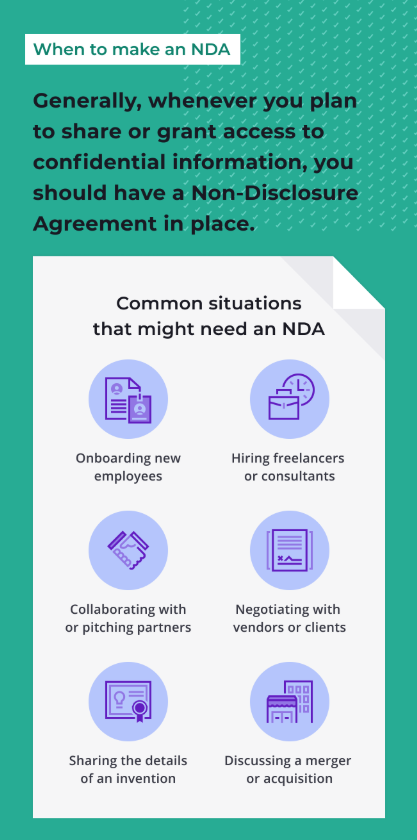What is Non Disclosure Agreement?A Non-Disclosure Agreement (NDA) is a legally enforceable contract that establishes confidentiality between two parties—the owner of protected information and the recipient of that information. By signing an NDA, participants agree to protect confidential information shared with them by the other party. In addition to not divulging or releasing the information without consent, the recipient also agrees not to copy, modify, or make use of the information in any way that is not authorised by the owner. A signed NDA form can help you avoid a lot of problems as a business owner. Without a confidentiality agreement in place, your trade secrets and sensitive information can be disclosed publicly or otherwise used by employees, vendors, clients, or anyone else that you share them with. A Non-Disclosure Agreement lets the recipients of your proprietary information know that you expect confidentiality and it authorises you to take legal action if the contract is violated. Other names for a Non-Disclosure Agreement include: NDA, Non-Disclosure Form, Confidentiality Agreement, Confidentiality Statement, Confidential Disclosure Agreement (CDA), Proprietary Information Agreement (PIA), or Secrecy Agreement. NON DISCLOSURE AGREEMENTA non-disclosure agreement full form (NDA), also known as a confidentiality agreement (CA), confidential disclosure agreement (CDA), proprietary information agreement (PIA) or secrecy agreement (SA), is a legal contract between at least two parties that outlines confidential material, knowledge, or information Why Non-Disclosure Agreement is required?Whether you are considering a new business relationship or you have already entered one, it's often smart to make a Non-Disclosure Agreement. Employees, business partners, and vendors are often privy to sensitive information that should be protected from disclosure to the outside world. Without a signed confidentiality contract, your business data and trade secrets could become public knowledge without your consent. Types of Non-Disclosure AgreementsNDA are of three types:-
When to sign a Non-Disclosure Agreement?
Benefits of entering into an Non-Disclosure AgreementAs discussed above NDA is an agreement between two or more parties whereby they agree to disclose confidential information among themselves but excludes all other from the right of accessing that information, except in some circumstances. Five Advantages of signing an Non-Disclosure Agreement:
Enterslice can help you make an Non Disclosure Agreement, all you have to do is follow simple steps:
1 Comment
ABOUT 80G REGISTRATION :Our Business licensing and regulatory approval team provides all possible help in dealing with the office of Commissioner of Income Tax (Exemptions) to get registration under section 80G & 12A of the Income Tax Act, 1961 for your NGO at very affordable prices. 80G registration helps you receive donations and enable you to issue exemption certificates to the people who have donated to your NGO. 12A Registration exempts your NGO’s excess income over expenditure from income tax purview. A NGO, registered under Section 80G of the Income Tax Act, 1961, can issue exemption certificates to the person, who has made some donations to the NGO. Such exemption certificates issued by the NGO will enable the donor to claim and avail income tax exemptions up to the 50% of total donated amount. Therefore registration under Section 80G is very important for a NGO, so, it can receive donations from general population, corporate under CSR Schemes etc. Steps to get 80G Registration :
Information & Documents Required for 80G Registration :
|
Details
AuthorWrite something about yourself. No need to be fancy, just an overview. Archives
December 2019
Categories |




 RSS Feed
RSS Feed
